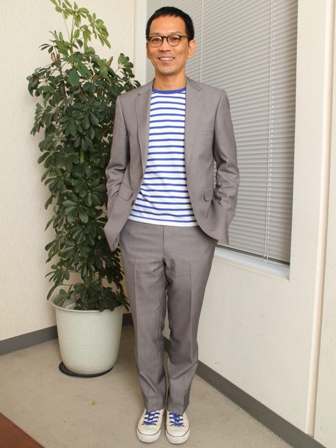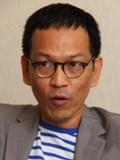Competition “Headshot”
Interview with Pen-ek Ratanaruang (Director)

A film as homage to American film noir classics.
Director Pen-ek Ratanaruang has achieved a unique status in the Thai film world and draws international attention. His latest film “Headshot” is not a rendering from his original scenario, but is based on a novel. A hitman is shot in the head and his vision turns upside down. The present and the past of his life are intricately intertwined in the story. Here is the interview with Director Ratanaruang who has broken new grounds with the Asian noir.
— The film is based on the novel “Rain Falling Up the Sky” written by Win Lyovarin. How is this novel received in Thailand, and why did you think of making it into a film?
Ratanaruang: The author of the novel is a friend of mine, who is not making a huge hit but has ardent fans. After making the film, I found out that there were more readers of the novel than I had imagined. The original novel itself is like a movie, and is written as if it is film noir. Of course I made changes and cut some parts of the novel, but I faithfully followed the novel in the opening scene. The novel was written as if it was for the filmization.
— You must have been interested in the theme of the novel.
Ratanaruang: It is clear that the theme of the film is ‘karma.’ You get what you deserve. Since Thailand is a Buddhist country, karma is a part of life. And as I grow older, I’m much drawn to the theme.
— Looking back at your previous films, one can see clarity in plots of your early works such as in “6ixtynin9,” and “Transistor Love Story,” but since “Last Life in the Universe,” your style has changed into portrayal with use of imagery and atmosphere. What do you think of the differences between your past tendency and your latest work?
Ratanaruang: I can say that my latest film is one of the farthest from my personal world. In series of my work as in “Last Life in the Universe, Invisible Waves,” “Ploy,” and “Nymph,” I dealt with very personal world of my own, and all these works were experimental. Some of them worked out well, and others didn’t. Concerning my latest film, as there is an author of the novel, I simply enjoyed making it as an homage to American film noir. You can say that it was the result of utilizing the directing skills that I have developed through the years, rather than the result of using my intellectuality.
— When you think of American film noir, we call up the image of old monochrome works. Were you conscious of this nuance concerning the screen image?
Ratanaruang: When we were dealing with location, designing, and costume, the color tone turned out to be pale, which wasn’t intentional but came out rather spontaneously. In the film, the path which the protagonist undergoes is very dark, and only when he becomes a monk in the midst of the story, his ephemeral peace of mind is portrayed through images of temples and forests. Then the story gets back to the tough and dirty world. The color tone throughout the film is the simple result of this story structure.

— In the ending of “6ixtynin9,” there is a quote from Truman Capote’s ‘Music for Chameleon,’ which is ‘When God hands you a gift, he also hands you a whip.’ You seem to be consistently exploring the theme of karmic retribution and redemption.
Ratanaruang: I think that phrase in Capote’s novel is very Buddhist. As the Buddhist doctrine goes, life has good times and bad times, so do not get overjoyed at good times, and do not get badly discouraged at bad times. The middle-ground is the best. The protagonist cannot escape from his karma. In fact, Buddhist or not, everyone has one’s own karma. In this film, karma is portrayed rather as a component of human being than from Buddhist point of view.
— The protagonist of this film sees everything upside down, and moreover, all the characters involved with him reveal themselves to be much different from what he had thought them to be, each of them having one’s own secret. When all turn upside down and the protagonist has nothing to lean on, he finds his own self. In that sense, this is film noir as well as the story of self-searching journey.
Ratanaruang: That is apparent, which means accepting everything.
Ratanaruang does not seem to be conscious about his latest style, but in “Headshot”, his earlier style of having clear plots and his recent style of having imagery shots are both alive. The fusion of the two styles gives depths to the characters and his unique world.
Interviewed by Masaaki Oba (Film Critic)












